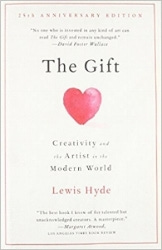It has been said to not only study those who inspire us but to study those that inspired those that inspire us. In other words, get to the root of the idea. This principle has proved valuable to me many times, but it seems that Lewis Hyde's, "The Gift" has been the most significant. "The Gift" was recommended to me by several different artists and authors that I look to for inspiration. Written in 1979, "The Gift" is a modern classic. It truly is the gift that keeps on giving (pun intended). Without any further adieu, I wanted to interact with the text a bit.

"The Indian giver (or the original one, at any rate) understood a cardinal property of the gift: whatever we have been given is supposed to be given away again, not kept... As it is passed along, the gift may be given back to the original doner, but this is not essential. In fact, it is better if the gift is not returned but is given instead to some new, third party. The only essential is this: the gift must always move." (4)
I had never understood the movement of a gift to be something so essential until now. Hyde gives many examples to prove his case. The power of the gift is not just in the receiving of it, but in what one does after receiving it. This makes so much sense to me! Is this not completely applicable to our journey with God? The power of God comes not just when we receive the gift of Christ Jesus, but when we choose to obey and bear fruit. Hyde also tells of a traditional belief in Wales that when fairies give bread to the poor, the loves must be eaten on the day they are given or they will turn to toadstools. Doesn't this bring imagery of God giving the people of Israel manna to eat in the wilderness? It was a gift from God that had to be consumed, or for this argument, had to be allowed to move on, if not the gift would rot.
Hyde expands on this further:
"There are many other examples of teachings as transformative gifts. Spiritual conversions hae the same structure as the AA experience: the Word is recieved, the soul suffers a change, and the convert feels moved to testify, to giev the Word away again... That is to say, most artists are converted to art by art itself... For it is when art acts as an agent of transformation that we may correctly speak of it as a gift." (59)
He hits the nail on the head! Art has a transformative power, that when digested and passed along, makes it a gift. It's no accident that when describing talented people we say they are "gifted." It's as if they had received what ability they have from some other. I know there have been countless times where I have walked away from an art piece feeling absolutely transformed. This transformation then births in me inspiration that I must create and, pass along the gift.
"It is the cardinal difference between gift and commodity exchange that a gift establishes a feeling-bond between two people, while the sale of a commodity leaes no necessary connection... The disconnectedness is, in fact, a virtue of the commit mode. we don't want to be bothered!" (72)
And herein lies the crux of the art community, how does one make a living? Hyde sets up the problem very well. We are so drenched in the idea of art as a gift, that when he begins to introduce the ideas of the free market, and commodities it all feels rather gross. I had always wondered how artists are to thrive in the economy, while not "selling out," but Hyde doesn't really answer this question. Instead, he adds to the conversation and leaves it to the artist's discretion.
At first, I was frustrated by his decision to not give a summarized answer to the question we all have, but then it dawned on me how his non-response is really the only response he could have given. After presenting the facts of gift-giving and the free market, the pros and cons are laid out with both. He gives the artists who read this book room to wrestle. Isn't this what great art does? It allows us to think for ourselves. Toward the end he writes:
"The problem is not 'Can gift and commodity coexist?' but 'To what degree may one draw from the other without destorying it?'" (358)
The best way to preserve the gift-giving economy, in my opinion, is to have a third party price and sell an artist's works. It is then that the artist is able to surrender themselves to the gift making and not have to be muddied by knowing the current market value. However, I know artists who are able to thrive in both. "Selling out" only happens once the artist is taking their personal gift, and adapting it for cash. It is then that the artist is a slave to the consumer.
At the end of the day, I will always want to have a "second job" that pays the bills. I want what I create to not be bound by having to make money and find a buyer. What I create is a gift from God alone, and I want those who encounter my works (in various mediums) to be transformed and encouraged to create themselves.
If you have not read, "The Gift" by Hyde Lewis, please go check it out. It will be worth it.
-Louis


